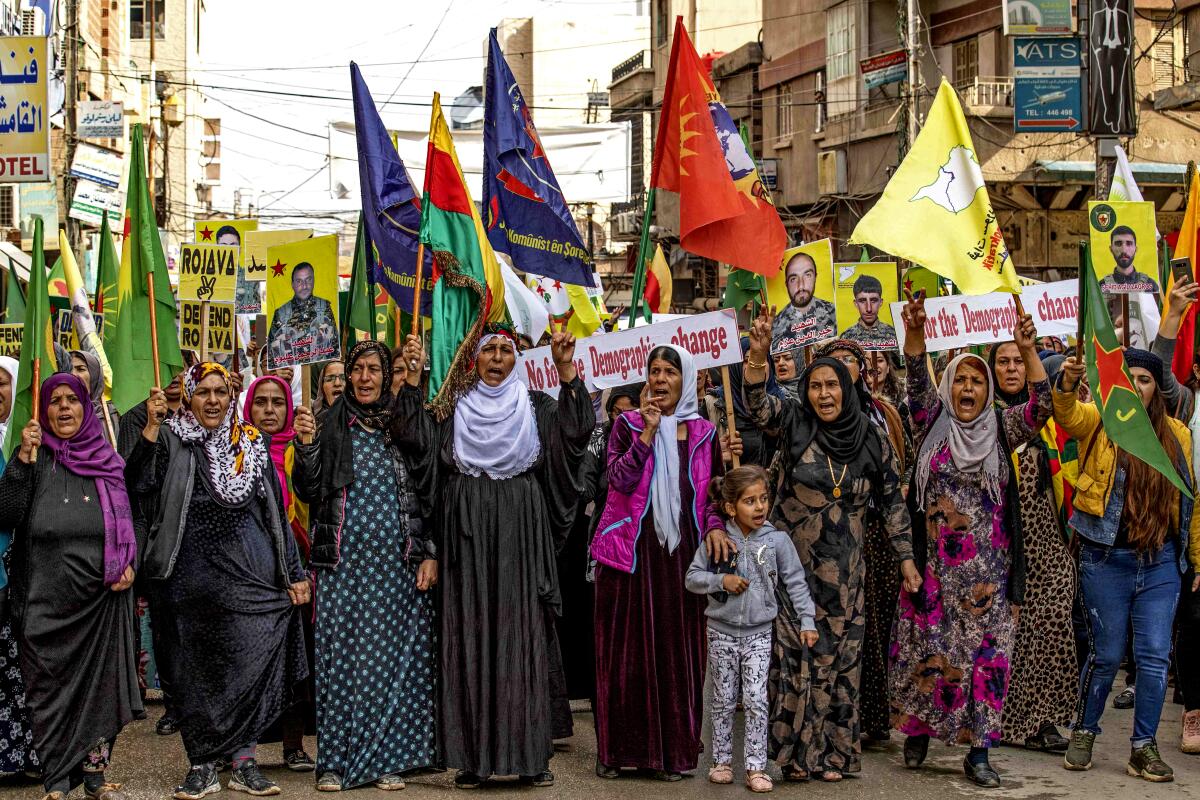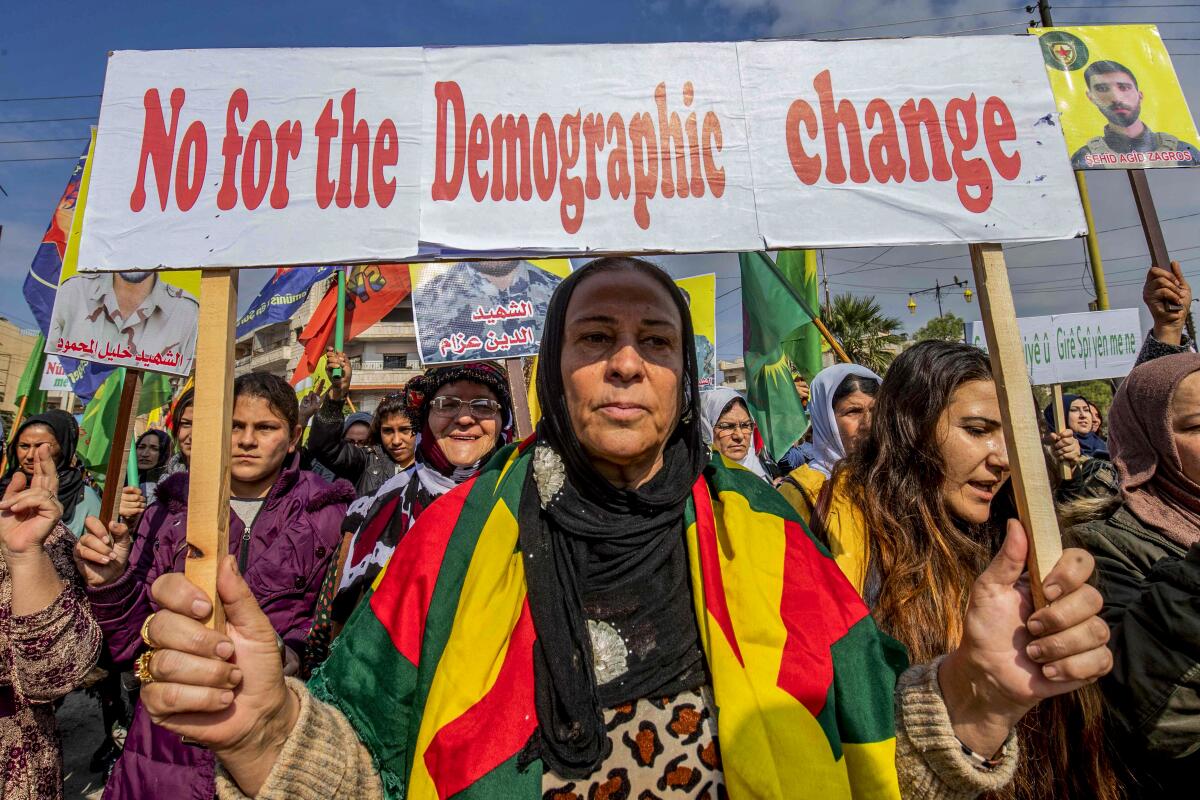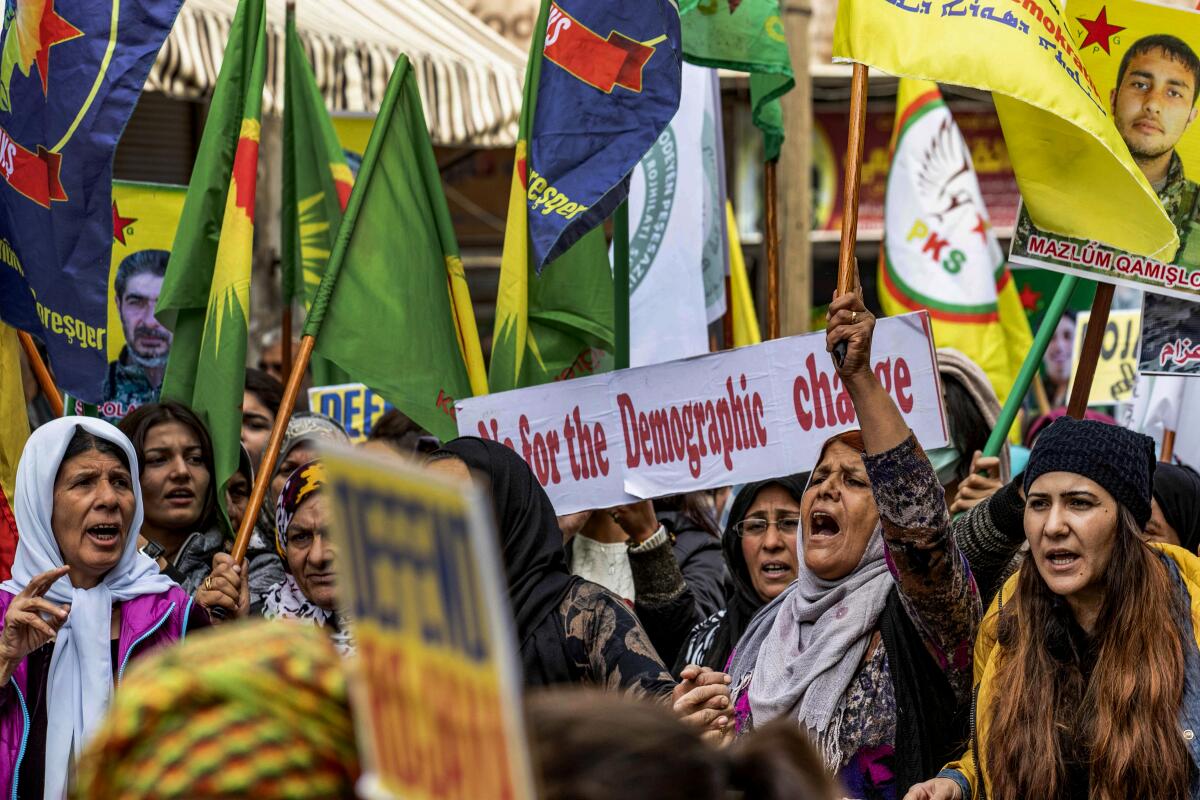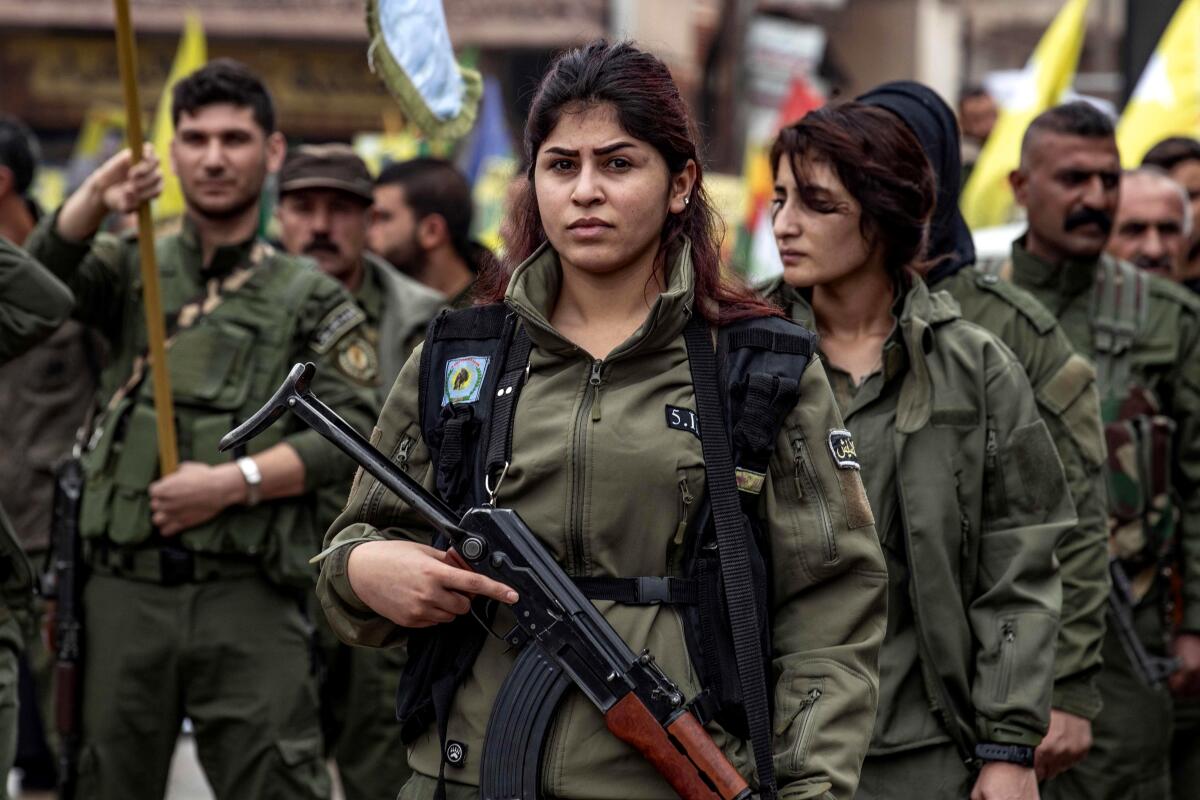Scenes of turmoil: Kurds protest Turkey’s incursion into Syria, lament U.S. withdrawal

- Share via
QAMISHLI, Syria — They marched through the streets of this ethnic-Kurdish hub along the border with Turkey on Saturday, denouncing Ankara’s expansion into Syrian border regions that are the traditional homeland of many Kurds.
Their epithets targeted Turkish President Recep Tayyip Erdogan, who has championed a a policy of seizing such territory.
“Long live Rojava!” the demonstrators chanted, using the term for the de facto self-governing ethnic Kurdish region in northern Syria. “Erdogan the criminal! Erdogan the terrorist!”
Protesters hoisted banners declaring “Defend Rojava” and bearing the likenesses of Kurdish fighters who died in the U.S.-backed battle against Islamic State militants in northern and eastern Syria before President Trump’s withdrawal of most American forces.

“Our sons and brothers were killed defending this land from the terrorists, and now Erdogan is sending them back,” said Badyaa Ameen, 55, who was among hundreds of women leading the march. “We will never give up our land. We will reclaim our territory.”
While Erdogan has drawn the Kurds’ principal ire, there is also broad indignation at Trump’s withdrawal from northern Syria — a move widely seen as a green light for Ankara to launch its Oct. 9 attack across a broad swath of the Syrian border.
The Kurdish-led forces had been Washington’s major partner in the battle against Islamic State, a bloody campaign that cost the lives of thousands of Kurds.
“Shame on the United States — Trump betrayed us,” said Ameen. “He gave the go-ahead to Erdogan to steal our land. But we will not surrender.”
**
The recent Turkish advance into northern Syria was a body blow to Kurdish dreams for this region.
Since most Syrian government troops withdrew from the area in 2012, a Kurdish-led coalition has carved out an autonomous zone covering a third of Syria’s national territory. The Kurds defended the zone against Islamic State militants with the help of U.S. air power — but angered Ankara.
Erdogan views Syrian Kurdish forces as terrorists because of their ties to Kurdish rebels in southeastern Turkey. Many Syrian Kurds, in turn, accuse Erdogan of deploying proxy forces consisting of Al Qaeda and Islamic State Arab militants against them.

Ankara has long pushed for a “safe zone” along its southern border with Syria, both as a security buffer and a place to resettle millions of Syrian refugees now living in Turkey. But from a Kurdish perspective, Erdogan’s ambitions amount to ethnic cleansing, forcing out traditional Kurdish communities and replacing them with Arab Syrians.
A Russian-Turkish deal last month mandated that Kurdish-led military forces withdraw to points at least 19 miles south of the border. Replacing them has been a mix of Syrian government border guards and joint patrols involving Russian and Turkish troops.
The deal also ceded to Ankara’s control a Syrian border strip about 80 miles long and 20 miles deep into Syria, where Turkish-allied forces had attacked on Oct. 9. Included was the largely Kurdish border city of Ras al-Ayn. More than 200,000 people fled the Turkish onslaught, according to Kurdish authorities. Turkey or Turkish-allied militias now control much of the Turkish-Syrian border zone.
On Saturday, authorities reported that at least 13 people were killed in a blast in the northern Syrian border town of Tal Abyad, which was among the areas overrun last month by Turkish-backed militias. There was no immediate claim of responsibility for the attack.
Kurds vow to recapture Ras al-Ayn and Afrin — the latter a historic Kurdish town in Aleppo province in northwest Syria. Turkish-allied forces attacked and occupied Afrin in 2018, prompting thousands of Kurds to flee the area.
**
“Mahmoud, come back to me, my son,” cried the disconsolate mother, who was pounding herself in the chest with her son’s shoes. “Why have you left me, Mahmoud?”
She expressed her lament one afternoon last week in the courtyard of a small hospital in the town of Tal Tamr, just south of the Turkish-controlled border zone. Thousands fled to Tal Tamr while escaping the Turkish advance. Evacuated wounded were initially treated at the town’s hospital.
The woman’s son, Mahmoud Khalaf, 39, had been killed by sniper fire as Turkish forces advanced on their village, Tal Ward, about 10 miles to the north of Tal Tamr, in the Turkish-controlled strip.
According to his family, he was just a civilian caught in the attack.
His body lay in a makeshift morgue in the rear of the hospital. Hospital workers soon carried his remains, in a black body bag, to the rear of waiting pickup truck. His grieving mother was helped into the pickup. The truck headed for the cemetery.
**
A cement barrier, not unlike portions of the wall along the U.S.-Mexico border, snakes along stretches of the Turkish-Syrian frontier. Erdogan began constructing his border wall in the years after the Syrian civil war broke out in 2011. Among the communities on the Syrian side is the mostly ethnic-Kurdish town of Derbasiyah. The town is outside of the Turkish-controlled zone but close enough that many residents have fled — and others are ready to go.
“We are packed, we can leave anytime,” said Daham Gasso, 41, a high school teacher and father of four in Derbasiyah, showing visitors bulging suitcases and backpacks stacked in his living room
Gasso’s extended family, including 19 people, had been primed to flee a few nights earlier, amid rumors of a new Turkish offensive. But they stayed, and things seemed to quiet down in recent days.

But the Gasso family, like others in Derbasiyeh, remains in a volatile border sector, a geopolitical hot spot near deployments of forces from Turkey, Russia, the Syrian government and the Kurdish-led militia — as well as a small number of troops from the United States, who remain in the region to protect oil resources, according to Trump. Foreign troops keep rolling through this strategic stretch of terrain.
“Really, we don’t care about the oil — we don’t get any benefits from it anyway — and we don’t really understand the geopolitics,” said Gasso. “What we want is to be left in peace, to live our lives normally.”
++
“Are you Ahmad?” the caller asked in Arabic.
Ahmad, who asked that his last name not be used for security reasons, is among the many Kurds who fled the Syrian border town of Ras al-Ayn last month as Turkish-allied forces attacked. He, his wife and three children escaped here to the safety of Qamishli in the heart of Kurdish Syria.
Pro-Turkish Arab forces soon captured Ras al-Ayn and occupied other nearby areas.
“Yes, I am Ahmad,” he responded to the caller. “Who are you?”
“Never mind who I am,” the caller said. “The important thing is that I am in your apartment.”
The caller sent a live video feed of the flat to Ahmad, 35, a former staffer of an international aid group in Ras al-Ayn.
The caller was clearly from one of the Arab militia groups serving as proxy forces for Turkey in northern Syria. Many Kurds who fled Ras al-Ayn said their homes were looted and businesses burned.
Apparently, the caller had discovered Ahmad’s cellphone number in the apartment, which Ahmad and his family had fled in great haste.
“Did you ever work with the SDF?” the caller demanded of Ahmad, using the acronym of the Syrian Defense Forces, the military wing of the Kurdish-led administration in the northeast.
Ahmad responded that he had not worked with the SDF. The caller asked if any of his neighbors had done so. Again, Ahmad said no, that all had private employment.
“We shall see,” the caller said. “If you are telling us the truth, you are safe to come back to Ras al-Ayn. If not, we will burn down your home.”
In an interview, Ahmad said he had no intention of going back.
“Even if these militias leave Ras al-Ayn, I will never return,” he said. “I can never trust people there again.”
More to Read
Sign up for Essential California
The most important California stories and recommendations in your inbox every morning.
You may occasionally receive promotional content from the Los Angeles Times.










